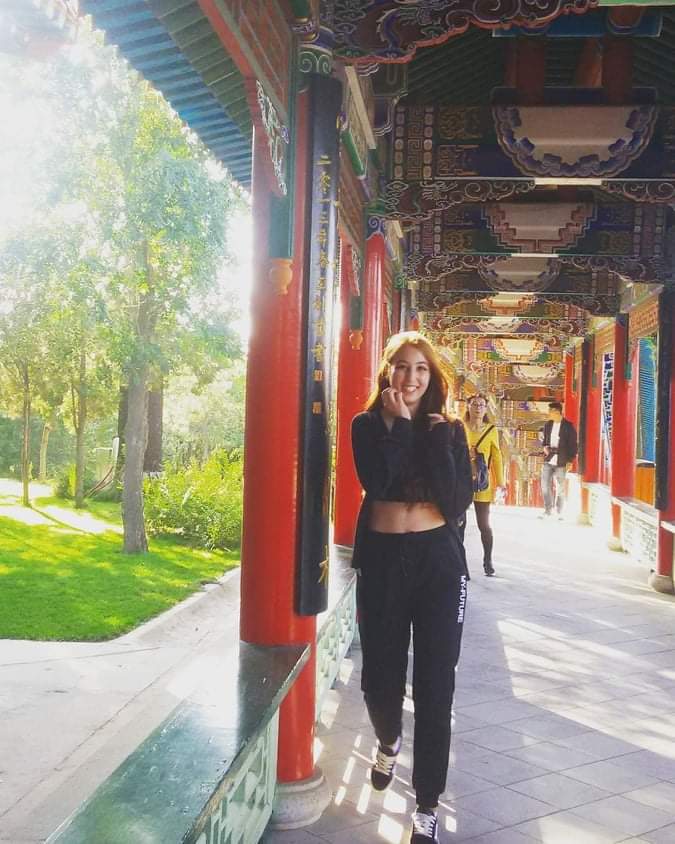Sometimes, the best way to find yourself is to leave your comfort zone and observe yourself from outside the box. This is why Mertsia from Georgia left Europe for an eye-opening experience of observing the Chinese culture from a European perspective.
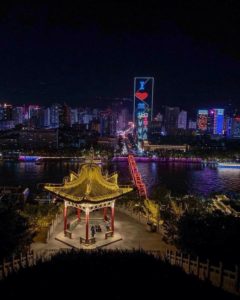
The City of Lanzhou (photo: Salta Chva, Instagram Username: @saltuwaa_)
Dreams do come true sometimes. That’s exactly what I experienced at the age of 16. After studying Chinese for three years, Confucius Institute Headquarters awarded me with a one semester-scholarship to study in one of the biggest countries in the world – China!
That’s how my adventure in the Far East began. In a blink of an eye, I turned into an independent teenager living in Lanzhou, the capital and the largest city of Gansu Province. Hardly did I suspect that this experience would be more than just visiting a country with a different culture. It turned into the story of finding myself as an individual in diversity.
Overcoming the Language Barrier – The Key to a Foreigner’s Heart
In big cities of Eastern China, like Beijing and Shanghai, a foreigner almost can’t feel any language barrier as most natives can speak English. But in North-Western cities, such as Lanzhou, communication can become a real problem. Even in banks, I rarely met someone who could communicate in English. That’s why I considered myself blessed to have studied Chinese before visiting the country – well enough to even enjoy engaging in conversations with locals. In the very beginning, two of my friends and I used the tactic we jokingly called “the power of three: the speaker, the listener, the translator”. I used to be the one conversing with the citizens, while the listener was deciphering the answer and the translator was interpreting it in English. Day by day, my Chinese was getting better and better – I even reached a level high enough to become a student at Beijing University of Science and Technology.
People often ask why I chose to study such a difficult language instead of focusing more on Europe like most Georgians tend to do. I perceive Chinese as a more challenging language, reflecting mysteries of a culture so much different than mine, therefore I found it attractive to pursue and explore. It was my way of embracing cultural differences. Actually, I think I killed two birds with one stone – in China, there were many exchange students from all over Eurasia that I managed to brush up my skills in English and Russian. This experience assured me of the importance of studying foreign languages – they are the main key to the foreigners’ hearts. Most people tend to open up much more when you talk to them in their mother tongue, whether it is Chinese, English or Russian. These are the most memorable moments – achieving an inspiring conversation is not only the positive outcome of studying hard, but opens the doors to new and exciting experiences.
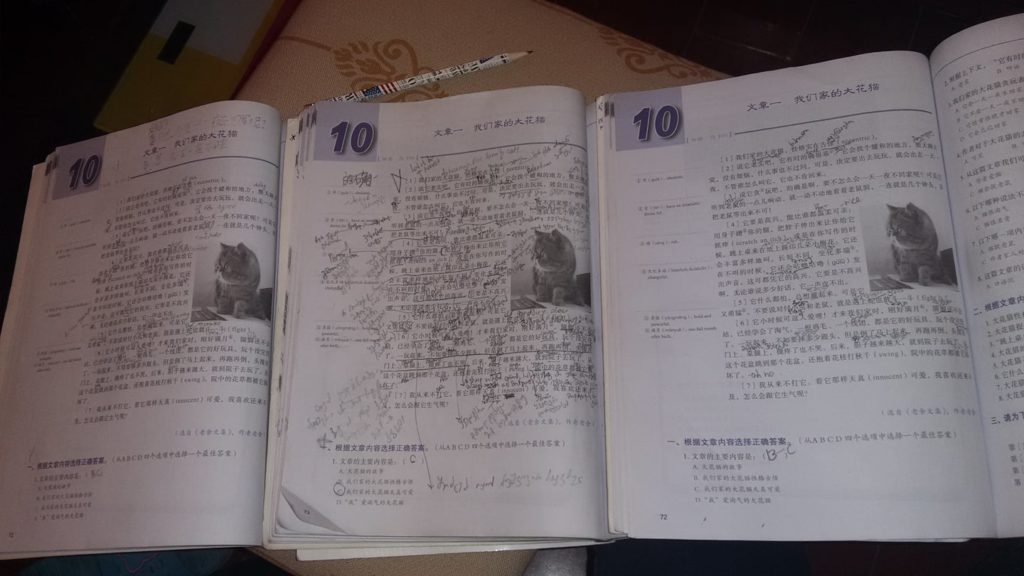
Our notes during the lecture at Lanzhou University (photo: private)
Embracing Cultural Differences
I must have looked overstrained when I first arrived in Lanzhou. Although I was used to living in a crowded capital Tbilisi with more than one million inhabitants, feeling comfortable in a city with a population three times bigger was a real challenge for me. I was surprised – in a larger city, I started beholding the details which I would turn a blind eye to back in my smaller hometown. Everything around me was unique, starting from the larger scale of cultural diversity and architecture to the nuances of local daily life. For instance, the people only use one hand to count to ten in China. Only after coming back to Georgia I noticed I had started using these hand gestures to count as well. I have also caught myself adapting new words to my everyday vocabulary, for example by calling famous brands with Chinese names: Referring to Coca-Cola as “Kele” became completely normal. The best thing was that my eagerness to explore was reciprocal: most of the Chinese love to interact with foreigners, they greet you with a curious smile, praise you for good looks and wish you a nice day – a mentality I got to know for the first time.
Adapting to the lifestyle of a foreign student in China was difficult – waking up early in the mornings, attending intensive language classes, listening to Daily News through installed loudspeakers, getting used to another way of thinking. I noticed that when Chinese people make a decision about something, they will hardly change their mind, no matter how hard you try to convince them of other solutions, approaches or perspectives. It annoyed me at first, but after some time I realised that diversity, reflected in such details and differences, is the “spice of life” and that knowledge is the key to being tolerant of something different from you.
I would not have been able to get used to all of the cultural differences without the friends I made. The first word that comes to my mind regarding “friends” is the dormitory – the place where you spend most of your time with other students and get to know their traditions. After visiting each other’s rooms at the end of exhausting days at university, playing around, drinking tea or coffee while telling funny stories, eating instant noodles like a Chinese student would do, or trying food which your friend made especially for you, I concluded: by embracing differences and opening my horizons, I found a new home.
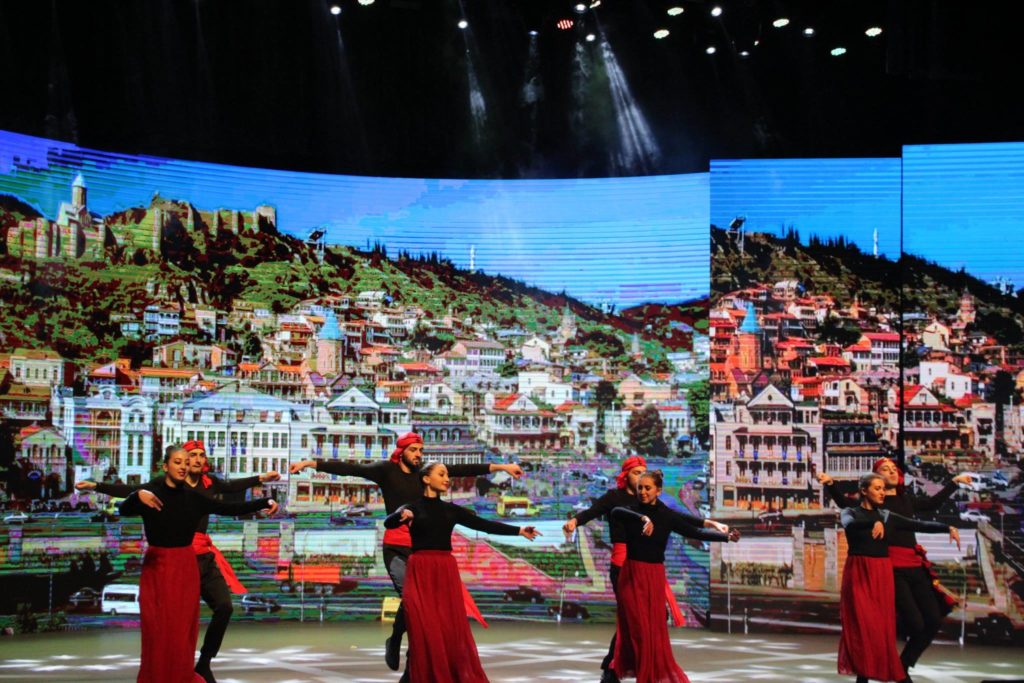
Performing the Georgian traditional dance “Acharuli” in our handmade clothes – a cultural appreciation day of exchange students in Lanzhou (photo: private)
I also had the chance to express my own identity, observing my cultural values from a different angle in the process of learning others. The Lanzhou University held a cultural appreciation day of exchange students and I, along with other Georgian participants, performed the Georgian traditional dance “Acharuli”. We didn’t have any costumes with us, so we had to improvise with the available materials by painting scarves with red felt-tip pens and sewing dresses from the curtains. Teaching the locals basic dance moves was an exciting experience.
Food – The Way of Socialising
During my time in China, I noticed that the most effective way to overcome cultural boundaries is to focus more on the similarities rather than differences. For example, it turned out that one of the easiest ways to the heart of another culture’s representative is through the stomach. The main thing that both, local and foreign students love to do is to walk out from their dorms at midnight and enjoy the street food which is an essential part of the culture in Asian countries. The food is so rich in fat and the portion for one person is so large I could almost never finish it. Nevertheless, back in Georgia, I started to miss the taste of the unhealthy but delicious cuisine. It was a common practice among us as foreigners to wrap up the meatballs in a napkin to absorb some fat before eating. The process of finding this solution made me realise that closing the mental door to comprehend the characteristics of unalike cultures is a mistake. Instead, we should be looking for the ways leading to the golden mean, and try to experience the nuances of other traditions without losing our own.
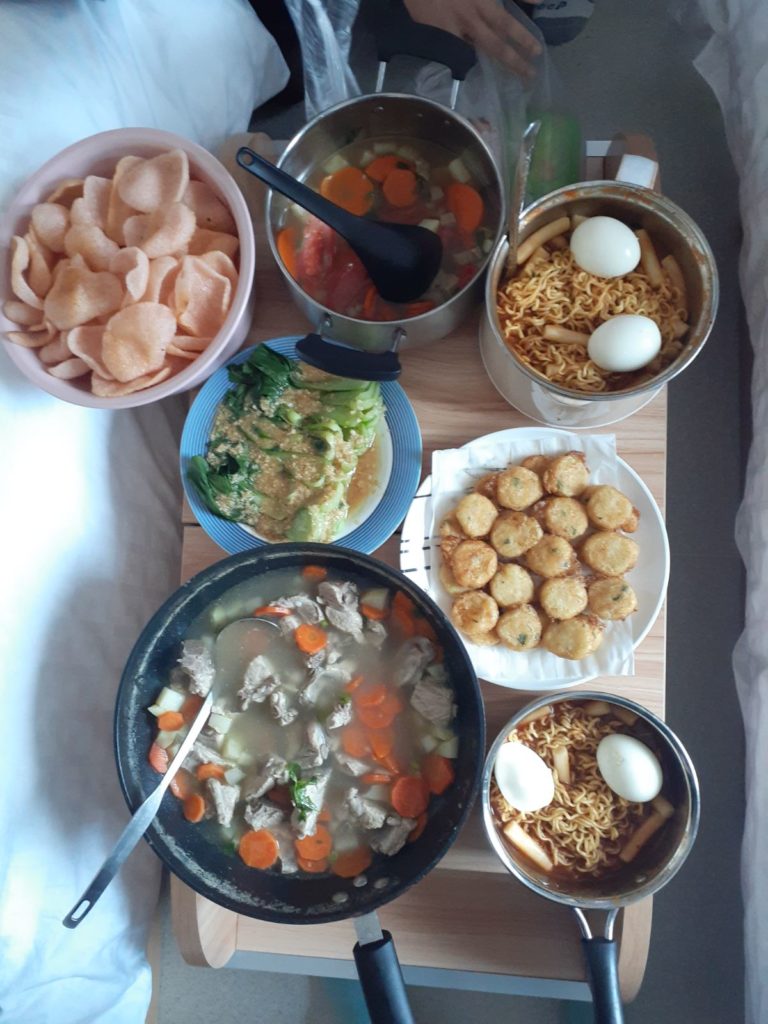
Taste of Memories, Lanzhou University Dormitory (photo: private)
Studying in China (and generally, being an exchange student) doesn’t mean you stay at university and study or play with your friends in the dormitory all the time. It also means constant seeking and appreciating yourself as an individual by observing and finding parallels between you and the image of the other. Chinese people are experts in popularising their culture and made me curious about exploring the famous places in the country. I used to save part of my monthly allowance to have adventurous trips with my friends, for example to the Gobi Desert. The travel broadened my mind, and I noticed that China had altered my life – thanks to the choice I made. It helped me shape my personality, open up to new possibilities by gaining education, thus becoming more tolerant to something different. I have caught myself using the manners I got to know in China: I tend to crave for spicy noodles and rice which do not belong to the Georgian everyday diet at all, even making my family adapt to Chinese cuisine. And there is another tradition I keep following since my return home: red became an essential color of my wardrobe as it is the vital part of Chinese culture. In the end, China became part of my identity.

Camel ride in the Gobi Desert (photo: private)

